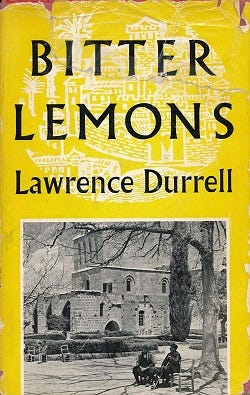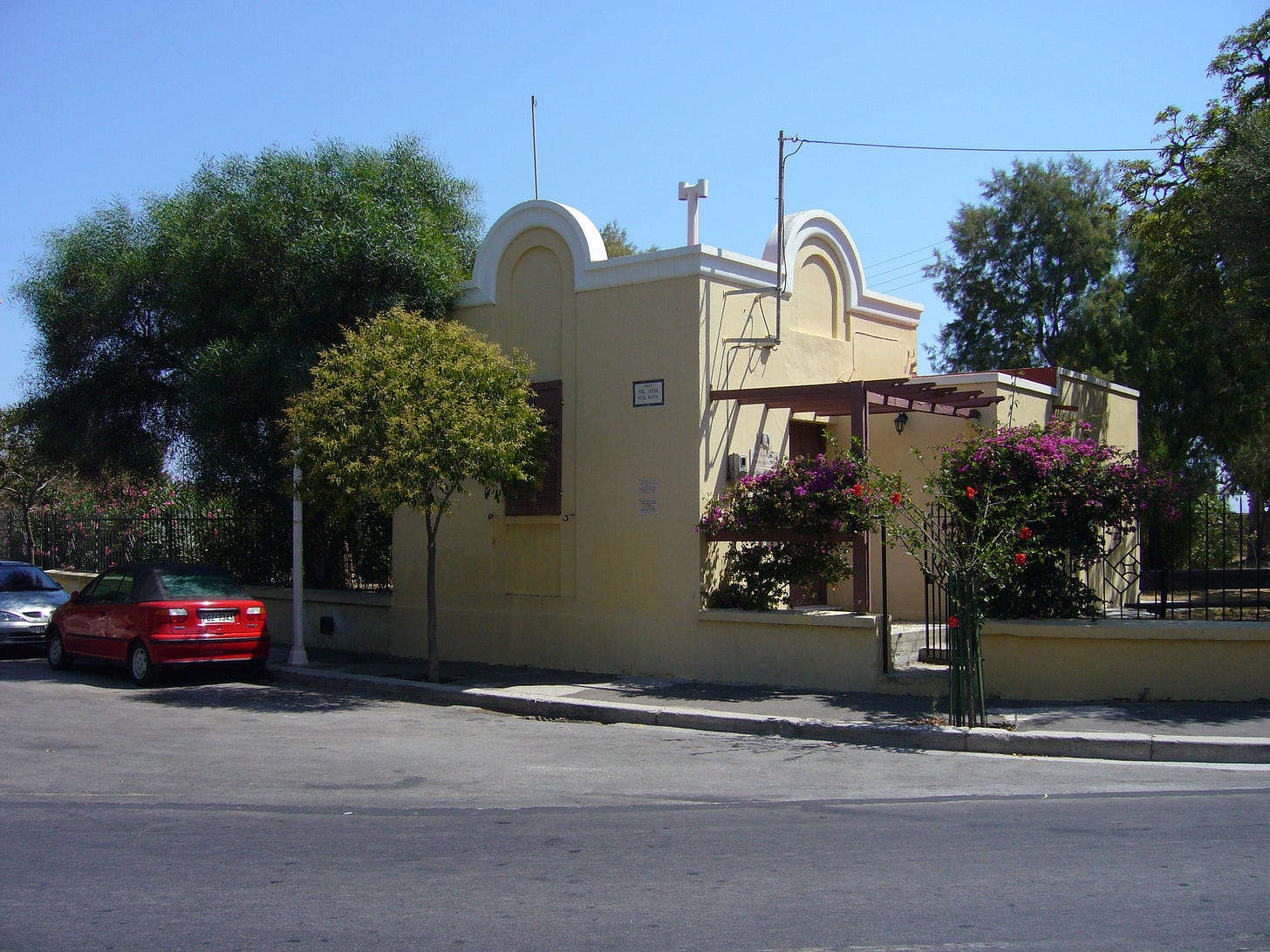Portraits of France: In Lawrence Durrell's Provence
The Languedoc, really, where the novelist spent the last quarter century of his life in a house in Sommieres. Your faithful reporter paid a visit, and the memories live on.
SOMMIERES, FRANCE—Sticklers for geographical accuracy would situate Sommieres in the Languedoc region of southern France and not in Provence. Thus when Lawrence Durrell’s last book, “Caesar’s Vast Ghost: Aspects of Provence,” was published just before the British-Irish author’s death in November 1990, some of his neighbors in this medieval burg by the Vidourle River scolded him good-naturedly for sprinkling photographs of Sommieres among the pages of the text.
Durrell replied that what he had in mind was the ancient Roman provincia, but it is unlikely that such distinctions really concerned him. What probably mattered more, as he sat each afternoon drinking white wine on the riverside terrace of the Bar Glacier, was that 30 kilometers south of Sommieres the swift green current of the Vidourle drained into the Mediterranean. This steamy sea had been the cauldron of Durrell’s inspiration. The vivid settings of his novels and travel books are flung like a garland around its hot-blooded waters: Alexandria, Cyprus, Rhodes, Corfu, Avignon.
Strange, then, that the austere stone manor in which the writer chose to spend the last quarter-century of his life is so atypical of the sun-drenched architecture of the region. Actually, this 19th-century house on the Route de Saussine, surrounded by high stone walls and an unkempt garden, was picked out by his third wife, Claude, after the spectacular success of “The Alexandria Quartet” convinced her that their cottage in the hills above Nimes was no long suitable.
Alas, of all of Durrell’s marriages, his union with Claude was the one that ended while it was still happy, with her death, the following year. “Only of late,” Durrell sorrowed in a subsequent poem, “have I come to see this house/ As something poisoned when I paid for it;/ Its beauty was specious and it hid pure grief.”
A fourth marriage followed, and nearly a fifth. Durrell’s companion for the last six years of his life was Francoise Kestsman, a slim, gray-eyed writer and translator who emigrated to France from Poland in 1956. “From the beginning, he wanted to get married,” Kestsman told me during a visit to Sommieres. But she rebuffed him, saying she didn’t see why it was necessary.
Then Durrell’s health began to fail. “He would become very anguished because he said that women had always left him. To reassure him, I said okay, on one condition, that he would let me repaint all the walls on the ground floor. He said, whatever you want. And he died the following morning.”
Durrell had dedicated “Caesar’s Last Ghost” to Kestsman, “magnificent in her generosity and her beauty.” Also, he might have added, in her devotion.
In 1991, the year after Durrell’s death, and in collaboration with some of his literary friends, Kestsman tranformed the ground floor of the Sommieres house into the Centre d’Etudes et de Recherches Lawrence Durrell. The research center, which provided short-term room and board to students and academics (and where I stayed for a night during my visit), housed several collections of Durrell’s books and papers. Only serious researchers were admitted, however; the occasional tourist who showed up expecting a tour was turned away.
The late Michael Haag, a close friend of the couple who published Durrell’s correspondence with Henry Miller, told me on the telephone: “Francoise is carrying the torch, keeping the flame alive. Here is this big house, and the presence that once filled it is gone. A lot of people might say, well, why bother, what torch, and so on. But she’s decided to do it.”
Although many of Durrell’s books were based on his experiences as a British Foreign Service officer in the Mediterranean, it was in Britain that his work was most harshly judged. His steamy romanticism (nowhere on more display than in the first volume of “The Alexandria Quartet,” “Justine”) was often dismissed as overheated and lacking depth.
Durrell’s prose is “drenched in wine and olive oil,” wrote the British author Anthony Burgess. “Because he preferred warm expatriation to the tepid recording of adultery in Hampstead, he was regarded as a kind of baroque traitor to our insular literary traditions.”
Durrell’s work was more enthusiastically received in the United States, and he is particularly appreciated in France, where his florid prose translates well. Durrell, for his part, contemptuously referred to Britain as “Pudding Island.”
Lawrence’s brother, Gerald Durrell, the naturalist and best-selling author, related in his memoir “My Family and Other Animals” how the young Lawrence bullied their widowed mother into moving the family to the Greek island of Corfu. He quoted Lawrence as saying: “I can’t be expected to produce deathless prose in an atmosphere of gloom and eucalyptus.” It was on Corfu that the Mediterranean adventure began for both brothers.
When Lawrence moved to Sommieres, after the publication of “The Alexandria Quartet,” he sold the whitewashed cottage in Nimes to his brother. I found him there with his American wife Lee, nursing a glass of white wine on the patio overlooking the sun-baked garrigue. The face behind his white beard bore a jarring resemblance to Lawrence’s.
“Larry said to me, why don’t you come down to this part of France?” Gerald said. “It’s got all the attributes of Greece, but with better cooking.”
Lawrence’s appreciation of the cuisine, and especially the wines, of southern France was notorious. Nevertheless, Gerald told me, “I would put him down as a very sad, unhappy man. He was so humorous and quick-witted that it was hard to put your finger on it. You had to look beneath all those layers of glitter.”
Certainly Claude’s death, and the suicide in 1985 of his daughter Sappho, cast melancholy shadows over Durrell’s last days. “I have never found anything that really pleased me,” Durrell once told an interviewer. “I have always lived posthumously, although very gaily.”
So what is left behind? There are the books, of course. If staying in print is the best answer to the critics, the posthumous Durrell can muster a wide library shelf of rejoinders. There was a brother just down the road. And roaming the stone house in Sommieres, a devoted near-window who kept the lights burning late into the night.
Notes and afterword:
This piece is adapted from an article I published in the International Herald Tribune in 1992, four years after I moved to Paris from Los Angeles. Although I had been a fairly successful freelancer in L.A. for a number of years, landing in a foreign country, even France, and expecting to continue as a writer was a risky proposition. I had a great stroke of luck, however. An editor I had worked with at the Los Angeles Times moved to Paris at the same time I did, to take a job at the “Trib.” Between her and other editors, I was able to rack up at least 40 pieces for the paper before their freelance budget ran out. I still consider those works, including the one above, as some of the best of a long career (43 years and counting.)
Some of the people I talked to for this story are now gone. Gerald Durrell died in 1995, just a few years after I drank white wine with him in the hills above Nimes; and Michael Haag, whose writings about Alexandria and other Mediterranean cities were so erudite, died just last year. The research center in Sommieres is no more—Francoise Kestsman sold the archives to the University of Paris at Nanterre in 1995, and the house in Sommieres around the same time. The last we heard she was still alive in living in the medieval Languedoc city of Uzes.
For better or worse, as I branched out as a travel writer after I moved to Paris, Durrell’s florid style (along with Jan Morris’s) greatly influenced my own, which I think is evident in the article above. My style has simmered down somewhat since then, although I still consider Durrell one of the greatest of all novelists—even if I suspect that the criticism that he lacks depth could be at least partly right. But what is so superficial about hanging out on the terrace of a house in the Languedoc, or a cafe in the heart of Alexandria? Life is short.
More troubling to me were allegations that Durrell abused his daughter, Sappho, which were much debated after his death. Durrell’s admirers defended him against the charges, of course, and I have no opinion on them one way or the other. Obviously I have to hope they were not true.
After I published the piece in the Trib, I joined the International Lawrence Durrell Society, and have paid my dues diligently all these years. For those interested in Durrell, they are a good place to start. Or just read his books, if you have not already. Summer is upon us and there is no better time.








How wonderful to be reminded of a time when reading the Alexandria Quartet was a time of reverie and revelation... I remember the almost hallucinatory quality of reading it, immersed in that thickly atmospheric writing. Thanks, Michael.